
Is Nepal's democracy in danger?
by Rabindra Mishra
A political crisis in Nepal is set to worsen after the postponement,
for the third time, of elections for a Constituent Assembly (CA) that
has to draw up a blueprint for the country's future.
Many analysts are doubting if the polls will be held at all.
They also say the latest postponement of the polls will only benefit
the monarchy, which is ironic given that all the major parties have
agreed on the abolition of the monarchy.
The Maoist rebels have been blamed for the postponement of the
elections for coming up with two new demands:
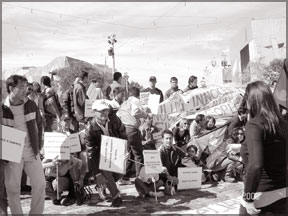
That the monarchy be abolished immediately by the present, interim
parliament
That the CA elections be held on a fully proportional voting system
Both the demands contradicted their earlier agreement with seven
political parties who they joined in opposition to King Gyanendra.
The postponement of the polls should be viewed against the wider
Maoist strategy.
Change
In their days as a guerrilla force, their fundamental strategy was to
gain influence in the countryside before surrounding and entering the
capital, Kathmandu, for a final strike.
A decade of insurgency left them dominating much of rural Nepal.
But when the Maoists realised intimidation and violence were less
effective in Kathmandu, they changed their strategy.
In late 2004, they decided to work with mainstream political parties
to further their goals.
The strategy received a boost when King Gyanendra sacked the
democratic government and took over power in February 2005.
Enraged by the king's action, the mainstream political parties, who
had in the past refused to collaborate with the Maoists, decided to
accept the rebels into their fold.
Together, the Maoists and the seven mainstream parties took on the
king in a series of street protests in April 2006 that resulted in the
king handing back power.
In subsequent months, the Maoists became part of the interim
parliament and the government.
They also went about gaining as much influence as possible in
commerce, the media and other areas of public life in the capital.
So having established themselves in Kathmandu, they have one final
objective left - to capture power. Most analysts agree that the Maoists
have little chance of doing this through competitive politics. They have
lost much of their influence in the countryside, and are unpopular in
the cities.
Pressure
That seems to be why they wanted November's elections put off.
In the meantime they will try to pressure other parties to agree to
their demands for the immediate ending of the monarchy and for the CA
polls to be held under a fully proportional voting system.
They have also shown an ability to outwit their opponents in a way
that erodes the authority of much of the state.
It was the failure of the democratic parties, the king, the army and
other security agencies which made the Maoists' journey to the capital
possible in the first place.
Now they have reached a point where they seem able to put a break on
a national objective like holding elections, something that virtually
the entire country had agreed on.
This, many say, has severely weakened the public's confidence in its
legitimate institutions.
Many people have begun to talk about Nepal entering an era of either
ultra-rightist (military or military-backed) or ultra-leftist (Maoist)
dictatorship.
They are not ruling out bloodshed between the army and the Maoists,
who have concentrated a large number of their members in Kathmandu.
The coming days and months are crucial for Nepal's fragile peace
process. So is the special session of parliament on Thursday which will
look into various options to address the prevailing crisis.
It is understood that the army has already opposed the idea of the
current interim parliament declaring Nepal a republic.
Sources say the army is also unhappy about Prime Minister Girija
Prasad Koirala's Nepali Congress Party's recent decision to vote for the
abolition of the monarchy when the Constituent Assembly meets.
The Maoists have now hinted that they are ready to compromise on the
timing of the abolition of the monarchy.
But they look far less likely to compromise on the proportional
representation issue. Whatever is decided - and other options are up for
discussion - the result could well need amendments to the constitution
and relevant electoral laws.
From all this mess, it is King Gyanendra who is gaining.
From a position of rock-bottom unpopularity, when he had to give up
power in April, 2006, his standing has been gradually picking up -
thanks to the chaos and discord among the political parties and Maoists.
Some leaders now say that democracy in Nepal is in serious danger.
They are arguing that a broader coalition should be formed which
would also take into its fold the pro-monarchy forces to stop the
country from sliding into dictatorship. But the wider held view is that
a final showdown between the army and the Maoists in Kathmandu is more
likely than ever.
If such a situation arises, nobody knows who will prevail.
However, one Indian expert on Nepal, retired Gen Ashok Mehta,
believes that Delhi would be prepared to give military help to the
government in Kathmandu rather than see the Maoists seizing power by
force.
BBC Nepali service
A Nobel nod for 'giant' discovery
The effect is called giant magnetoresistance, but it enables amazing
things at the miniature level.
Two European scientists won the 2007 Nobel Prize in physics Tuesday
for their discoveries of the phenomenon, which spurred some of
computing's most astonishing developments, from video-playing handheld
devices to PCs whose storage capacity now seems all but limitless.
|
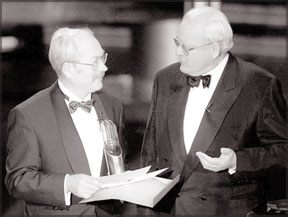
France's Albert Fert and German Peter Gruenberg won the 2007
Nobel Prize in physics on October 9 for a discovery that has
shrunk the size of hard disks found in computers, iPods and
other digital devices. |
France's Albert Fert and Germany's Peter Gruenberg independently
described giant magnetoresistance in 1988, then saw the electronics
industry apply it in disks with incredible amounts of storage.
"I can hardly think of an application that has a bigger bang than the
magnetic hard drive industry," said Phil Schewe, a physicist and
spokesman for the American Institute of Physics.
"Every one of us probably owns three or four or five devices,
probably more, that depend on billions of bits of information stored on
something the size of a dime."
Fert, 69, is scientific director of the Mixed Unit for Physics at
CNRS/Thales in Orsay, France, while Gruenberg, 68, is a professor at the
Institute of Solid State Research in Juelich, Germany. They will share
the $1.5 million prize.
Gruenberg told reporters he was not too surprised to win the Nobel.
"Because I have received a lot of awards, I was often asked, `When will
the big award come?'" Gruenberg said.
Asked if he'd thought his discovery would have such wide application,
Fert told The Associated Press: "You can never predict in physics. ...
These days when I go to my grocer and see him type on a computer, I say,
`Wow, he's using something I put together in my mind.' It's wonderful."
Here's how it works.
As a metal disk spins inside a hard drive, an arm with a sensitive
electromagnetic head at its tip hovers over the disk, somewhat like the
needle on a record player (though it doesn't make contact). This head
reads bits of data by registering the magnetic bearing of individual
particles; it writes data by changing that magnetic orientation.
For disk drives to increase in capacity, those magnetic particles
must become smaller, so more can be packed into the same amount of
space. But these ever-tinier materials produce fainter magnetic signals,
which means the read-write head in the disk drive has to become more
sensitive.
What Fert and Gruenberg independently discovered was that extremely
thin layers of alternating metals could detect remarkably weak changes
in magnetism - and translate them into "giant" changes in electrical
resistance.
In other words, the particles used in data storage could get much
denser and still produce the electrical signals that computers read as
ones or zeros as they do their business.
It took until 1997 for giant magnetoresistance (GMR) to get
translated from Fert and Gruenberg's raw science into a product for the
disk market. That was led by IBM Corp., where researcher Stuart Parkin
developed a way to incorporate Fert and Gruenberg's findings into the
cost-effective manufacturing process already used to produce disk
drives.
One result can be measured in disk-drive density - the number of bits
that can be squeezed into a given area.
In the 1990s, disk density was generally improving about 60 percent a
year. But GMR sparked a few years in which density doubled - a 100
percent rise - and costs still fell.
The steep ramp explains how today's top iPods pack more storage than
desktop computers of just a few years ago. (For instance, Apple Inc.
offers a 160-gigabyte iPod - 10 times the capacity of IBM's first GMR
drive for PCs a decade ago.)
GMR also helped herald the promise of nanotechnology in computing,
said John Best, chief technologist for Hitachi Ltd.'s data-storage unit.
AP
'Dirty War' priest gets life term
A court in Argentina has convicted a former Roman Catholic police
chaplain of collaborating in murders during the country's military rule.
Christian Von Wernich, 69, was convicted for involvement in seven
murders, 42 abductions and 31 cases of torture during the 1976-83 "Dirty
War".
Survivors say he passed confessions he obtained from prisoners to the
police. As he was sentenced, Father Von Wernich showed no emotion.
Protesters torched his effigy outside the court. The trial in the town
of La Plata, 60km (35 miles) south of Buenos Aires, had lasted for three
months.
Father Von Wernich initially avoided prosecution by moving to Chile,
where he worked as a priest under a false name.
However, he was eventually tracked down by investigators and
extradited to Argentina in 2003 when amnesty laws passed at the end of
military rule were declared unconstitutional.
Participant
At the trial, several former prisoners said the former Roman Catholic
priest used his office to win their trust before passing information to
police torturers and killers in secret detention centres.
They say he attended several torture sessions and absolved the police
of blame, telling them they were doing God's work.
"Von Wernich participated assiduously and maintained direct contacts
with the detainees," the prosecution said in its indictment.
Father Von Wernich's lawyers said the case against him had more
doubts than certainties and that he had been obliged to visit police
detention centres as part of his duties.
The priest said he had never violated the prohibition against
revealing information obtained in the sacrament of confession and
accused those torture victims who gave evidence in court of being
influenced by the devil.
"False testimony is of the devil, because he is responsible for
malice and is the father of evil and lies," he said.
Outrage
Once the judge announced the sentence, observers inside the
courthouse erupted with relief and jubilation. Outside, crowds cheered
and set off fireworks.
"It's a historic day, a wonderful day... it's something we mothers
didn't think we'd live to see," said Tati Almeyda, a member of the
Mothers of the Plaza de Mayo, a group of women seeking their sons and
daughters who disappeared under military rule.
"Justice has been done. The Catholic Church was an accomplice," she
told the Reuters news agency. The BBC's Daniel Schweimler in Buenos
Aires says Father Von Wernich's actions caused particular outrage in
Argentina because he had abused the trust that believers placed in him.
While human rights activists and survivors will be celebrating this
verdict, they will now shift their attention to the Roman Catholic
Church in Argentina, our correspondent says.
The church has remained silent on the case, saying it was waiting for
the verdict, but it will again be asked about the role did it play in
the "Dirty War", he adds.
Between 10,000 and 30,000 people were killed or disappeared before
Argentina returned to civilian rule with the election of President Raul
Alfonsin in October 1983.
BBC
Junta hunts dissidents on UN computers
by Kenneth Denby in Rangoon
Burma's (Myanmar) ruling junta is attempting to seize United Nations
computers containing information on opposition activists in the latest
stage of its brutal crackdown on pro-democracy demonstrations, The Times
has learnt.
UN staff were thrown into panic over the weekend after Burmese police
and diplomats entered its offices in Rangoon and demanded hard drives
from its computers.
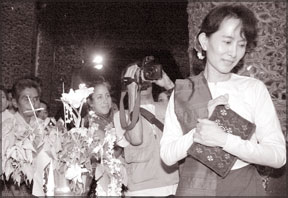
The discs contain information that could help the dictatorship to
identify key members of the opposition movement, many of whom have gone
underground. UN staff spent much of the weekend deleting information.
The stream of dramatic images of tens of thousands of monks parading
through Rangoon inspired condemnation of the Government across the
world. On Saturday( October 6), demonstrations denouncing the regime
were held as far apart as Sydney, Singapore, London and Washington.
Many of the images were disseminated through e-mail by Burmese
bloggers who used software to outwit attempts to block them. Even after
the Government shut down the internet altogether ten days ago,
photographs and films were smuggled out on tiny storage drives and
memory cards by travellers to Thailand.
Some of the demonstrators have reportedly been arrested after being
identified in footage of the rallies. The junta is going after the UN,
in the belief that its officials allowed images to be transmitted
through their own internet links - channelled via satellite phones and
therefore less vulnerable to interference by the authorities.
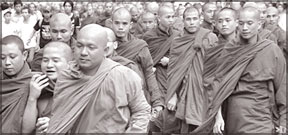
"It's part of this systematic, repressive response to the
demonstrations," said a Western diplomat in Rangoon. "We've seen them
focus on people who directly participated in the demonstrations by
picking them up through the videos Then they've arrested people with
cameras containing images of the demos. And now they're trying to track
down the means that were used to send them out."
On October 6th Burmese officials went to Traders Hotel in central
Rangoon, where several UN agencies have offices. They also called on the
Japan International Cooperation Agency in the Sakura Tower.
"Police and representatives from the Ministry of Foreign Affairs
showed up at JICA and the UN offices at Traders, asking to enter and
look at the hard drives of the computers," a UN official told The Times.
The staff refused their request and asked them to submit it in
writing to the UN's resident co-ordinator in Burma, Charles Petrie. When
a formal letter did arrive, it did not mention the computer hard drives,
but asked only to see the licences for the UN's satellite telephone
equipment.
Mr Petrie confirmed that the authorities had approached the UN, but
denied that this amounted to a raid. "All they asked was to see the
permits for the V-Sats [satellite telephones]," he told The Times. "We
told them that we will provide them through the appropriate channels."
UN officials are waiting to see whether the authorities will make a
determined effort to seize data and equipment. Such a move would further
enrage world opinion at a time when the UN is deliberating on a response
to the junta's crackdown. Today in New York, the UN Security Council is
meeting to consider a resolution by the US, Britain and France.
A draft reads: "The Council condemns the violent repression by the
Government of Myanmar of peaceful demonstrations, including the use of
force against religious figures and institutions."
The resolution may be vetoed as "internal interference" by China and
Russia. In London, at least 3,000 people marched to Trafalgar Square to
protest against the crackdown. Gordon Brown, the Prime Minster, issued a
statement, saying: "The world has not forgotten - and will not forget -
the people of Burma."
The Times, UK
Sarkozy takes a stand against Putin's Russia
by Charles Bremner in Moscow
President Putin of Russia has made a big shift towards Western
efforts to dissuade Iran from building nuclear weapons, President
Sarkozy claimed in Moscow last night.
The French leader emerged with the news after a three-hour private
dinner that was the first test of his resolve to add a harder edge to
his country's recently cosy relations with Moscow.
|
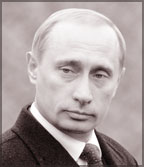
Russian President Vladimir Putin |
Chatting in his hotel, "Super-Sarko" appeared delighted with the
success of his "frank and passionate" session at Mr Putin's dacha on the
outskirts of Moscow. The session had been billed as a test of wills
between the powerful Russian boss and the would-be new strongman of
Western Europe.
Mr Sarkozy's tone towards the Russian leader shifted sharply from his
tough talk of recent weeks, in which he has accused him of "brutal" use
of Russian energy supplies as a weapon and criticised his assertive
stance abroad.
After dinner, Mr Sarkozy said that he had been impressed by Mr
Putin's courage, intelligence and understanding of the world.
In particular, he had sensed a shift on Iran. "I got the impression
that our positions have moved much closer together," he said. "There has
been an extremely positive change on the Russian side."
Mr Sarkozy declined to give details, but he said that Mr Putin did
not stick to Russia's hitherto position that Iran was merely developing
civil nuclear capacity.
|
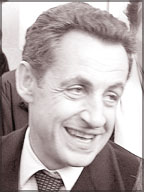
French President Nicholas Sarkozy |
The French President arrived for his first visit to Moscow sounding
the alarm over Iran's nuclear intentions and urging Moscow to join in
tighter sanctions to deter Tehran from building a bomb. Until now Russia
has resisted sanctions beyond those already imposed by the United
Nations.
Mr Sarkozy, in ebullient form, appeared to believe that he had gained
Mr Putin's ear on several contentious issues in their first extended
conversation since his election last May.
He said that he had detected new Russian openness on Kosovo, which
Europe wants to become independent from Serbia, against Russian wishes.
He had also broached his worries about Moscow's human rights record,
including the murder of Anna Politkovskaya, the campaigning journalist,
and the arrest of homosexual demonstrators.
"I told him that the world has high expectations of a unified Russia
and it was a pity that they should be tainted," Mr Sarkozy told The
Times.
In another approach that would have been unthinkable in the days of
Jacques Chirac's close friendship with Mr Putin, Mr Sarkozy said that he
had explained to the Russian leader "that France feels that it is good
friends with the Americans".
Russian officials did not comment on his version of the dinner, but
voiced reservations earlier in the day over the critical new French
stance towards Russia. As well as turning towards the United States, Mr
Sarkozy has moved fast to befriend Moscow's former subject states in
east and central Europe - the countries which Mr Chirac offended in 2003
at the time of the Iraq invasion.
He has visited Bulgaria, Poland and Hungary, his father's homeland.
In Sofia last Thursday he said that he was "half East European", and in
the past five days has been visited by Ukrainian, Polish and Czech
leaders.
However, his 24-hour visit to the Russian capital is a delicate
balancing act. He wants to assert new French influence in Eastern Europe
and globally, while retaining Moscow's favours by not appearing to be
obedient to Washington. France depends on Russia for more than 20 per
cent of its natural gas supplies.
Mr Sarkozy arrived to a sceptical reception after stating once again
that he was serious about persuading Russia to join the campaign to stop
Iran's military nuclear programme.
He told the Russian media: "Between resignation and war . . . there
is a responsible stance: toughening sanctions with the aim of bringing
Iran to its senses. We are talking about protecting our security from
the danger of nuclear proliferation. I will not give ground on an issue
which is of such great importance."
Times, UK
Almost all children aged 10-15 are victims of crime
Being a victim of crime is now the norm for most children in Britain,
according to research that reveals that 95% of 10- to 15-year-olds in
the country have experienced crime at least once.
A survey by the Howard League for Penal Reform of more than 3,000
children found that almost three-quarters had been assaulted over the
previous year, and that two-thirds had been victims of theft. More than
half the children had seen their property deliberately damaged, while
others reported threats or verbal abuse.
The study, entitled Children as victims: child-sized crimes in a
child-sized world, found the majority of incidents occurred in schools
and playgrounds, with much of the rest being between school and home.
But children were unlikely to report incidents to police or teachers
because they felt those adults would not be interested.
The wave of mainly low-level, child-on-child crime revealed by the
research suggests that government figures might have significantly
underestimated the level of crime experienced by young people. According
to the 2003 Home Office Crime and Justice Survey only 35% of children
aged 10-15 years had experienced at least one crime in the previous
year.
The League also found that children feared crime, and felt vulnerable
and scared. They wanted safe places for play, and even work
opportunities, at an earlier age, to help relieve boredom.
They also wanted to see a change in adults' attitudes, as they felt
demonised as perpetrators rather than seen as victims. Another study
published today, by Victim Support, shows how the line between
victimhood and offending is often blurred, with youngsters hit by crime
sometimes turning to violence in defence.
According to the League study, which ran from 2000 to 2006, 72% of
children were hit or kicked during the previous year, and more than half
threatened with violence. Almost a fifth had had something stolen
outside school, 11% had been robbed of money, and almost one in 10 of a
mobile phone.
Frances Crook, director of the Howard League, said: "Children are
rarely consulted about the impact of crime on their lives. If they were
adults would discover that children are frequently the victims of crime
perpetrated by other young people ... these crimes are often not
reported, as children think adults will not listen to them or that the
crime will be viewed as too small to bother with."
She added: "To children however, in a child-sized world, these crimes
... do matter. Ironically, the very institutions where children should
feel safest - their school environments set up and patrolled by adults -
are where children are most commonly victimised." The incidents had to
be kept in context, with bullying or racist name-calling being partly
down to "children behaving as children".
But she warned: "The danger is that adults become concerned only when
incidents become more serious, or break out from being child-on-child to
child-on-adult."
The League wants to see more conflict resolution in schools,
including perhaps restorative justice, with aggressors making amends to
victims. Victim Support wants support for victims and offenders, as many
children fall into both categories.
The Guardian, UK |
